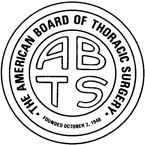American Board of Thoracic Surgery

Thoracic Surgery (Thoracic and Cardiac Surgery)
Thoracic surgery encompasses the operative, perioperative, and surgical critical care of patients with acquired and congenital pathologic conditions within the chest. Thoracic surgeons treat diseased or injured organs in the chest, including the esophagus (muscular tube that passes food to the stomach), trachea (windpipe), pleura (membranes that cover and protect the lung), mediastinum (area separating the left and right lungs that contains the heart), chest wall, diaphragm (separates the chest from the abdomen), pericardium (membrane covering the heart), heart (including the pericardium, coronary arteries, valves and myocardium) and lungs. The most common diseases requiring thoracic surgery include heart lesions, such as coronary artery disease and valve problems, lung cancer, chest trauma, esophageal cancer, emphysema, and heart and lung transplantation.
Contact the board to learn about specialty and subspecialty certification requirements.
Subspecialty
Congenital Cardiac Surgery
Congenital heart surgery encompasses the diagnosis, care, and operative treatment of structural abnormalities involving the heart and major blood vessels. Although these defects are generally present at birth, they may also develop in infancy and childhood. Congenital heart surgeons care for patients from the fetus to the adult.
